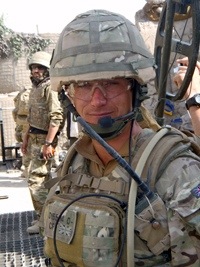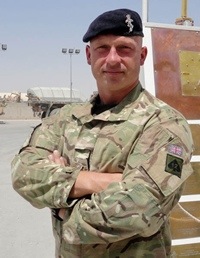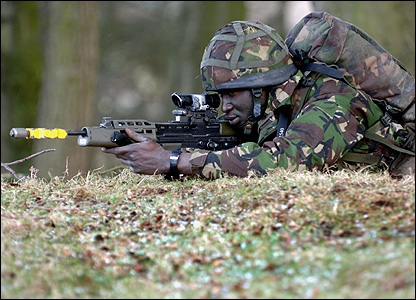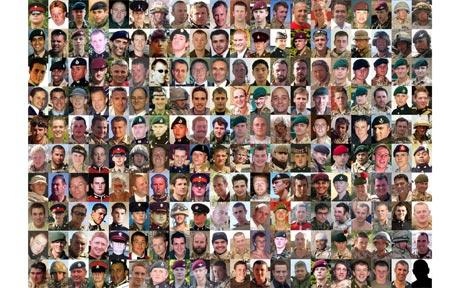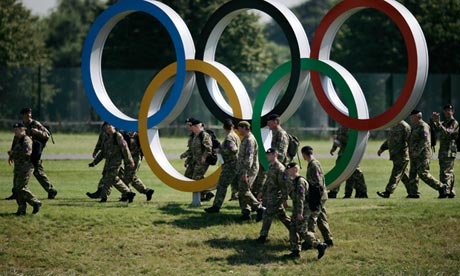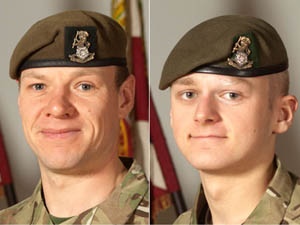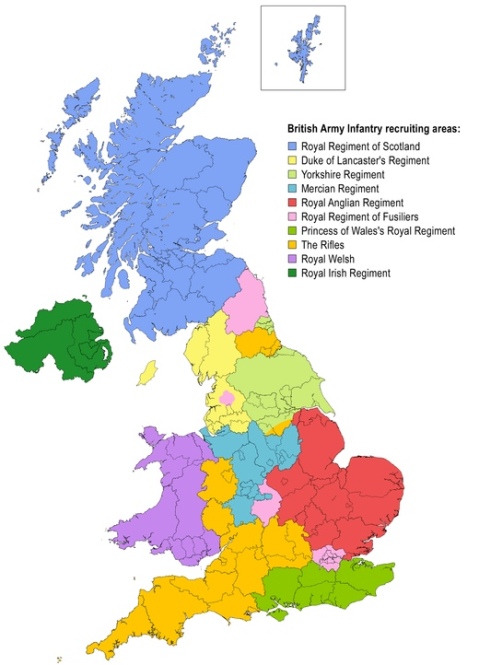Bravery medal awarded to British Soldier (28th September 2012)
Corporal Scott Dyson, who ran through enemy fire to give first aid to a casualty wounded by an insurgent bomb, has been recognised for his heroism.
Corporal Dyson, of 1st Battalion The Yorkshire Regiment was on a joint patrol with the Afghan National Army (ANA) in the village of Llara Kalay in Nahr-e Saraj when the ANA platoon came under fire.
The soldiers were besieged with a hail of machine gun and small arms fire, as well as rifle-launched grenades.
Dyson, from Leeds, reacted instinctively and began marshalling the ANA in how to suppress the enemy fire and protect their flanks while the remainder of his own platoon, in a separate patrol that had been providing support, had to take cover from the continued attack on their position 200 metres away.
‘Chaotic’
As the other patrol tried to occupy a compound they struck a large Improvised Explosive Device (IED), critically wounding two soldiers.
The scene of the explosion was chaotic with the blast blowing one of the casualties on to ground that had not been cleared of IEDs.
Ignoring the risk to himself, Scott ran through enemy fire across the 200 metres of uncleared ground and waded through a ditch to get to the stranded casualties and administer first aid.
The 29-year-old said: “I was worried there were more IEDs but I decided I had to help the casualties.
“There were four guys involved. I went to the one who had initiated the IED first but there was nothing I could do for him.
“Two others were dazed and a third was out cold and had serious injuries to the back of his legs. The first two regained their senses and we got the unconscious guy on a stretcher and extracted him.”
‘Outstanding leadership’
As incoming fire targeted the patrol Scott treated the casualties and arranged their evacuation to an emergency helicopter.
He said: “I went back to the soldier who had been killed and from the crater caused by the IED, pulled him across to me. At this point, I started thinking ‘I’m pushing my luck here’.
“I got him onto a stretcher and covered him up. The gunfire had stopped by now. I take my hat off to the ANA. They suppressed the enemy enough to allow the extraction.
“And later that day, the Afghan National Police went back and recovered kit that we couldn’t find at the time to stop it falling into insurgent hands and returned it to us, which really showed how our relationship had developed.”
Scott also paid tribute to the soldiers who played their part in ensuring no further casualties were suffered. “Without them, it wouldn’t have been possible,” he added.
His citation concludes: “Dyson displayed outstanding leadership and personal courage when responding to the fatal IED blast whilst under insurgent fire. Through outstanding personal example and prompt action in the face of grave danger, Dyson ensured that control of this chaos was regained, despite the personal danger he was in. His actions had a galvanising effect on the other soldiers involved and saved the life of another soldier.”
The Mention in Despatches is one of the oldest forms of recognition for gallantry within the UK Armed Forces. Since 1993 the Mention in Despatches has been reserved for gallantry during active operations.
The announcement was made today with the release of the latest operational honours and awards list, which includes 106 personnel. The awards are for actions roughly during the period 1 September 2011 to March 31 2012 during Operation HERRICK 15.
R.E.M.E death in Afghanistan (21st September)
The Ministry of Defence must confirm that Sergeant Jonathan Eric Kups, of the Royal Electrical and Mechanical Engineers (REME) died in Camp Bastion, Helmand Province, Southern Afghanistan on Friday 21 September 2012.
Sergeant Jonathan Eric Kups
Sergeant Kups was from Nuneaton, Warwickshire. He was born on 28 October 1973 and joined the Royal Electrical and Mechanical Engineers in June 1992 where he trained as an electronics technician. In the early years of his career, he specialised in radar and ground to air weapons, completing an operational tour in Northern Ireland.
As he progressed through his career he turned his expertise to the operation and repair of Electronic Warfare systems, subsequently completing a number of deployments with 14 Signal Regiment (Electronic Warfare).
In 2011 Sergeant Kups moved to 104 Force Support Battalion REME before being attached to 4 Close Support Battalion REME for its deployment on Operation HERRICK 16.
With his vast experience, Sergeant Kups was able to effectively lead and develop his soldiers in a very busy electronic repair section. A man of considerable military experience, Sergeant Kups was well respected by his section and by the unit as a whole.
Sergeant Kups’ untimely death is a great loss to his family and the Corps of Royal Electrical and Mechanical Engineers. He leaves behind his wife and three children.
Royal Engineers death in Helmand (21st September 2012)
It is with great sadness that the Ministry of Defence must announce the death of Captain James Anthony Townley from the Corps of Royal Engineers. He died in Camp Bastion, Helmand Province, southern Afghanistan from wounds sustained whilst serving at Forward Operating Base Shawqat on Friday 21st September 2012.
Captain James Townley was born on 22 September 1982 in Tunbridge Wells. He grew up near Glastonbury in Somerset, going to school in the local area. Having received a first-class degree in Engineering and Computer Science from University College Oxford, he worked as a tax associate for Price Waterhouse Coopers before attending the Royal Military Academy Sandhurst in January 2007.
He commissioned into the Corps of Royal Engineers in December 2007 and promoted to Lieutenant soon after completing his Royal Engineer Troop Commanders’ Course before serving in 28 Engineer Regiment, based in Hameln, Germany.
Captain Townley was an avid sportsman who enjoyed a wide variety of sports including skiing, mountain biking, kite surfing and sailing. Having rowed for his college at university, he later went on to represent the Royal Military Academy Sandhurst and his regiment.
Captain Townley was attached to 21 Engineer Regiment from 28 Engineer Regiment for the duration of Operation Herrick 17. He deployed to Afghanistan on 5th September 2012 with 4 Armoured Engineer Squadron, 21 Engineer Regiment and was based in the Nad-e Ali district of Helmand Province as the Battle Group Engineer supporting 1st Battalion The Royal Anglian Regiment.
Upon arrival, he immediately immersed himself in operations that directly supported the transition to Afghan-led security, providing specialist advice on engineer tasks and capabilities. He had quickly established himself as a professional and charismatic officer.
In his time with 28 Engineer Regiment he shone as an intelligent, experienced and highly competent individual who had great plans for the future. With unrivalled commitment to his soldiers, he combined consummate professionalism and ability with a personable, humorous and approachable character. Extremely popular with his fellow officers, Captain Townley lived life to the full and was at the heart of the Regiment both professionally and socially.
Above everything else, he will be remembered for his selfless commitment to every undertaking, his strength of character and his faultless integrity.
Captain James Townley, was a remarkable young man. He leaves behind his parents Peter and Jacqui, his brother Nick, and girlfriend Helen.
James’s family said:
“James was a wonderful, loving and caring son and brother. He was devoted to his girlfriend Helen. He was our guardian angel and our hero. We were so proud of him. He touched every part of our lives and his loss has left a huge chasm that we can never fill.
“James will never be forgotten and always in our hearts and thoughts.”

The joining process of a regular Soldier
GETTING STARTED
Remember: explore your options; get in touch with us and, if you do decide you would prefer to come and have a chat to one of our Army Careers Advisers; don’t worry about dressing up too much for the occasion. That comes later for your initial interview where you will be advised on what to wear and how it works beforehand.
INITIAL INTERVIEWS
Once you’ve decided to take your application to the next level, you will be invited for an interview with an Army Careers Adviser. The interview allows you to get answers to any further questions you may have about the Army, the joining process and how to prepare, as well as giving the Army Careers Adviser the chance to confirm your suitability for the Army.
To make sure you’re given the best advice, you’ll need to do same basic numeracy, literacy and reasoning tests. This will help find out which Army jobs are really best for you.
SELECTION
Providing you meet all the standards required and your medical report is favorable, you will be invited to attend two-days at an Army Development and Selection Centres (ADSCs). Here you will be tested to see if you have the potential to be a soldier. You will also be given a further Army medical to make sure you are fit and well enough to start your initial Phase 1 training. Watch the films below to find out more.
In order to prepare yourself for the ADSC medical you should be refreshed, get a good night’s sleep beforehand, drink plenty of water and avoid fizzy drinks as these can raise your heart rate.
INITIAL TRAINING
Having completed the Army Development and Selection Centre you’ll be given a grade. This will directly affect how long it will be before you are invited to start your initial training, know as Phase 1. Another factor that will affect this process is the number of places the Army has to offer for each specific trade. Therefore it is important you discuss your result with your Army Careers Adviser.
Where you conduct your Phase 1 training will depend on how old you are and which job you’ll be doing. If you are under the age of 17 years and 5 months you will be classified as a Junior Soldier and do either a six-month or 12-month course. If you are older than 17 years and 5 months you will conduct a 14-week package. Recruits joining the Infantry must complete a combined Phase 1 and Phase 2 course that lasts 28 weeks.
TRADE TRAINING
After completing Phase 1 training you will be considered a trained soldier and will be posted to a specialist training centre. There you will be taught the key skills required to perform your initial job. Phase 2 training can take from a few months to more than a year to complete depending on your job.
And the most important part… ENJOY IT!
TWO 3 York deaths in Helmand (16th September 2012)
It is with great sadness that the Ministry of Defence must confirm that Sergeant Gareth Thursby and Private Thomas Wroe, both of 3rd Battalion The Yorkshire Regiment (Duke of Wellington’s) (3 YORKS) were killed in Afghanistan on Saturday 15 September 2012.
The two men were shot and fatally wounded by a rogue Afghan Local Policeman in Checkpoint Tora in the Nahr-e Saraj district of Helmand province.
Both men served proudly and in the highest traditions of The Yorkshire Regiment. They will never be forgotten.
Secretary of State for Defence Philip Hammond said:
“I was saddened to hear of this cowardly act by a man wearing an Afghan Local Police uniform, which has taken the lives of two brave British soldiers.
“All of our thoughts are with the families of Sergeant Gareth Thursby and Private Thomas Wroe. They gave their lives protecting Britain’s national security, helping to make sure that Afghanistan never again becomes a haven for international terrorism.”
1st Battalion Grenadier Guards death (14th September 2012)
It is with great sadness that the Ministry of Defence must confirm that Lance Corporal Duane Groom, The Queen’s Company, 1st Battalion Grenadier Guards was killed in Afghanistan on Friday 14 September 2012.
Lance Corporal Groom was killed in action when his vehicle struck an improvised explosive device in the Nahr-e Saraj District of Helmand Province, Afghanistan.
Lance Corporal Duane Groom
Born on 7 April 1980 in Suva City, Fiji, Lance Corporal Groom joined the British Army in 2007. Having completed the Combat Infantryman’s Course at the Infantry Training Centre, Catterick, he moved to Nijmegen Company, Grenadier Guards, where he participated in public duties and ceremonial tasks at the Royal Palaces.
Two years later he joined 1st Battalion Grenadier Guards, participating in an overseas training exercise in Kenya before deploying to Afghanistan in September 2009 with The Queen’s Company.
Upon his return he made full use of his time, taking part in the Infantry Skiing Championships in early 2011 and attending a Junior Non-Commissioned Officer Cadre in January 2012. Newly promoted, he deployed to Afghanistan for his second tour of duty on 7 April 2012 as a member of the Operations Company for Combined Force Nahr-e Saraj (North).
As well as working with his parent company, for seven weeks of the tour he provided force protection for British military advisors to the Afghan National Army. It was in this role, while protecting his Afghan and British colleagues as they extracted from a successful operation that he was sadly killed.
Lance Corporal Groom was a superb soldier. Fit, conscientious and extremely hard-working, he displayed great potential. Operationally experienced, he was always willing to help others and was widely respected and liked by all. Although quiet and reserved, he possessed a great sense of humour and always had a smile on his face. He will be sorely missed by all who knew him.
